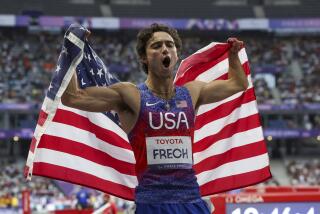U.S. Marathoners Get Left in Dust as World Goes By
- Share via
About 18,000 Americans will be among the 20,000 runners participating Sunday in the 14th Los Angeles Marathon.
But none will win.
The winner of the 26.2-mile race will emerge from a group of about three dozen “elite” runners brought in to enhance the event’s status.
Most are Africans.
None are Americans.
“We’d all love to have an American,” says Anne Roberts, who recruits the top runners for the Los Angeles, New York and Lisbon marathons. “But if there isn’t one, we can’t manufacture one.”
Indeed, elite U.S. marathoners have fallen off the map. Of the top 50 marathon times run last year, none was run by an American.
Long gone are the red, white and blue glory days of the ‘70s and early ‘80s, when Frank Shorter’s gold medal-winning performance in the 1972 Olympics at Munich triggered a U.S. running boom that spawned U.S. champions such as Bill Rodgers, a four-time winner of both the Boston and New York marathons, and Alberto Salazar, a three-time winner of the New York Marathon.
No U.S.-born man has won a major marathon since Greg Meyer at Boston in 1983.
New York hasn’t had an American winner since Salazar in 1982.
Two U.S.-born runners have won in Los Angeles, Ric Sayre in the inaugural race in 1986 and Paul Pilkington in 1994, but those results say more about the L.A. event’s minor league status than the state of U.S. marathon running.
Shorter is the last American man to have won an Olympic medal in the marathon, a silver in the 1976 Games, and no U.S. woman has won a medal since Joan Benoit Samuelson took home the gold in Los Angeles in 1984.
“It’s a real problem with the Americans right now,” says John Tope, who works with Roberts in recruiting elite runners to the L.A. and New York marathons.
What happened?
“Everybody’s debating this issue and everybody will have a different answer but I don’t think they train hard enough,” Roberts says. “They don’t have the same work ethic as the Africans. I think they are hindered by how and where they are raised.”
Rod Dixon of New Zealand, a former New York Marathon winner and a bronze medalist in the 1,500 meters at the 1972 Olympics, says it’s a matter of motivation.
“They’re not hungry enough,” he says of U.S. distance runners. “Maybe they have too many other things going on. When you look at the countries that are producing the best runners, it’s almost like there’s nothing else to do there. . . .
“In the more developed nations, we’ve much more going on and running starts to sound like too much hard work.”
Marie Patrick, co-founder and executive vice president of the L.A. Marathon, believes the emergence of an American contender would give marathons a huge boost.
“The popularity of any sport comes from heroes,” she says, “and for a long time, marathoning hasn’t had an American hero. So, if we could get back to the point where Americans are winning marathons again, it would be fabulous.”
Tope sees a potential emerging star in Adam Goucher, a student at the University of Colorado who won the NCAA cross-country championship last fall.
“He’s got the mind-set of a Frank Shorter or Bill Rodgers,” Tope says. “You know, ‘I’ll do what it takes to train and I’m willing to be spartan about it.’ And that’s what it’s going to take. You can’t allow yourself a lot of luxuries and still do the training that’s necessary.
“Most of these Africans train three times a day.”
That’s one reason a Kenyan or Ethiopian is expected to break the tape Sunday. The winner gets $35,000 and a car worth $24,300, as does the top woman.
Simon Bor, 30, of Kenya has the best time after finishing second in Amsterdam last fall in 2 hours 8 minutes 46 seconds, about 1 1/2 minutes faster than the L.A. Marathon record of 2:10:19, albeit on a flatter course than the more demanding L.A. layout.
Moges Taye, 25, of Ethiopia, won at Vienna last summer in 2:09:21, and Chris Cheboiboch, of Kenya, 22, won at San Diego last year in 2:10:54.
They head a field of elite runners that Tope describes as “talented and deep,” but not necessarily one that will be capable of producing a record time.
Favorite among the women is two-time defending champion Lornah Kiplagat of Kenya, who is trying to become the first three-time winner here.
She’ll be challenged by a field that includes the 1995 L.A. Marathon winner, Nadia Prasad of France, and five other women who have logged faster personal bests than Kiplagat: Alla Zhilyayeva and Svetland Zakarova of Russia, Helen Kimaiyo-Kipkosgei of Kenya, Aurica Buia of Romania and Irina Bogacheva of Kazakhstan.
Go to The Times’ Web site for an L.A. Marathon course map, a guide to watching the event, an online marathon game and--if you’re running--a calculator to figure your pace times: https://fold6.site/marathon.
The City of Los Angeles Marathon
SUNDAY
Start: 8:45 a.m.
Where: Starts on 5th and Figueroa; ends on Flower Street in front of Arco Plaza
TV: 8 a.m. Ch. 13
Detours, B4
More to Read
Sign up for The Wild
We’ll help you find the best places to hike, bike and run, as well as the perfect silent spots for meditation and yoga.
You may occasionally receive promotional content from the Los Angeles Times.






